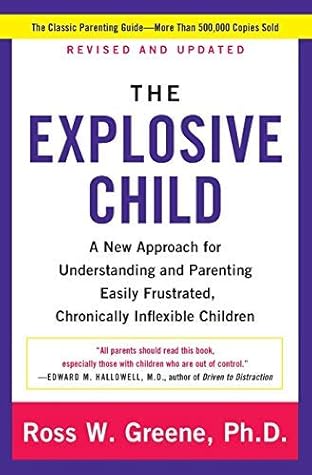More on this book
Community
Kindle Notes & Highlights
Started reading
February 15, 2023
Anyone can become angry, that is easy . . . but to be angry with the right person, to the right degree, at the right time, for the right purpose, and in the right way . . . this is not easy. —ARISTOTLE
Do the best you can until you know better. Then when you know better, do better. —MAYA ANGELOU
But the behaviors aren’t even the most important part. Rather, what those behaviors are telling us is the most important part. And what they’re telling us is that your child is having difficulty meeting certain expectations. Some kids withdraw when there are expectations they’re having difficulty meeting (otherwise they don’t withdraw). Other kids hit when there are expectations they’re having difficulty meeting (otherwise they don’t hit). While it’s tempting to focus on your child’s behaviors, in this book we’ll be focusing instead on the expectations they are having difficulty meeting that
...more
One of the things you’ll learn in the early chapters of the book is that the terms that have commonly been used to characterize kids with concerning behaviors—terms such as willful, manipulative, attention-seeking, limit-testing, contrary, intransigent, unmotivated—are inaccurate and counterproductive. You’ll also read that a lot of the things we’ve been saying about the parents of these kids—that they’re passive, permissive, inconsistent, noncontingent, inept disciplinarians—aren’t accurate or productive either. And you’ll learn that the psychiatric diagnoses that may have been applied to
...more
You know the things that are commonly said about kids who exhibit concerning behaviors: they’re manipulative, attention-seeking, unmotivated, stubborn, willful, intransigent, bratty, spoiled, controlling, resistant, out of control, and defiant. There’s more: they are skilled at testing limits, pushing buttons, coercing adults into giving in, and getting their way. You know (perhaps from personal experience) the things that are said about their parents: they’re passive, permissive, inconsistent, neglectful, inept disciplinarians. They botched the job. Don’t believe any of it. First, most
...more
And what are those conditions? Quite simply, when there are expectations they’re having difficulty meeting.
Kids who exhibit concerning behaviors are compromised in the global skills of flexibility, adaptability, frustration tolerance, emotion regulation, and problem solving.
He’s not lacking motivation? No, he’s not. But a lot of folks still think that. Why haven’t your efforts to motivate your child to behave more adaptively—with rewards and punishments—been successful? Because he isn’t unmotivated. If your kid could respond to problems and frustrations adaptively, he would. That’s because—and this is, without question, the most important theme of this entire book—kids do well if they can.
So, he’s not exhibiting concerning behaviors on purpose? No. The kids about whom this book is written do not choose to exhibit concerning behaviors any more than a child would choose to have a reading disability. And, in fact, that is an apt comparison. Kids who are having difficulty reading are lacking the skills required for being proficient in reading. Kids who are having difficulty adaptively handling problems and frustrations are lacking the skills required for being proficient in handling problems and frustrations.
So, if you’re not focused on behaviors—rewarding the ones you like and punishing the ones you don’t like—how will your child’s behavior improve? By focusing instead on the expectations your child is having difficulty meeting.
Does your child’s psychiatric diagnosis provide you with precise information about his lagging skills and unsolved problems? Not really. While diagnoses—such as ADHD, oppositional-defiant disorder, bipolar disorder, depression, autism spectrum disorder, reactive attachment disorder, disruptive mood dysregulation disorder—can be helpful in some ways (for example, they “validate” that there’s something different about your child, they might be necessary to qualify your child for special services, and they might be needed to convince your insurance carrier to pay for mental health services), they
...more
But aren’t some concerning behaviors more severe than others? Yes, no doubt. Some kids—the lucky ones—cry, pout, sulk, whine, or withdraw when they’re struggling with problems and frustrations. They’re lucky because caregivers tend to respond to these less severe behaviors in ways that are more supportive, empathic, and nurturing. Other kids—the unlucky ones—scream, swear, hit, kick, bite, spit, destroy property, or worse. These behaviors are definitely more severe, and we adults tend to respond to them in ways that are far less empathic and far harsher and more punitive. But whether a child’s
...more
So, we have some important things to figure out about your child. What skills is he lacking? The answer to that question will help you understand why your child is responding so poorly to problems and frustrations. What expectations is he having difficulty meeting? That’s going to help you know when your child exhibits concerning behaviors. If you identify those unsolved problems proactively, they become highly predictable. And if they’re highly predictable, they can be solved proactively rather than in the heat of the moment.
If your kid could be more flexible, handle frustration more adaptively, and solve problems more proficiently, he would, because kids do well if they can.
Handling problems and frustrations adaptively requires important skills, ones your child is lacking. It is very important that you come to see your child through the prism of lagging skills rather than lagging motivation.
Your child’s concerning behaviors—whether lucky or unlucky—are communicating that he is having difficulty...
This highlight has been truncated due to consecutive passage length restrictions.
Those expectations—called unsolved problems—are predictable and can be identified...
This highlight has been truncated due to consecutive passage length restrictions.


